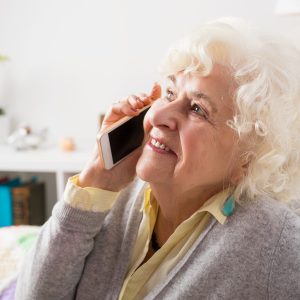Stay The Course: How To Keep Up Connections Despite Physical Distance

Stay The Course: How To Keep Up Connections Despite Physical Distance
May 20, 2020
We have known for a long time that social isolation and loneliness in older adults are at epidemic proportions in our country and can take a significant toll on the physical and mental health of seniors. (For a deeper analysis on this, take a look at the highly-praised new book from former Surgeon General Vivek Murthy, Together: The Healing Power of Human Connection in a Sometimes Lonely World.)The physical distancing necessitated by the coronavirus is just upping the ante: while protecting us from the severity and lethality of COVID-19, we may very well be exacerbating health problems due to lack of social connection. It’s a gamble for sure. And as states begin to open up and relax their quarantines, older adults are still being advised to limit social contacts to prevent exposure to the virus. Those living in nursing homes may have the worst of it, as new guidelines suggest an even longer time to wait to reconnect with loved ones. Many seniors are becoming desperate, as one recently commented, “I’m starting to feel that having COVID-19 might be preferable to isolation.”
The good news is that supports and programs have surfaced during the last several months to encourage continued contact with older loved ones and permit social connections that would otherwise fade away because of lack of physical contact. For example. AARP has put into place its Friendly Voice Program that offers to have a volunteer make regular phone calls and chats as a way to keep those who are isolated engaged. AARP also has a Mutual Aid program that allows you to find resources and assistance all over the U.S. for seniors in need of such services as food shopping or types of support.
A recent story on NPR underscored the importance of one-on-one conversations and connections, even if done remotely, to maintain mental health and create necessary intimacy for those who are sheltering alone. One project highlighted by NPR is the new “Stuck At Home(Together) Project,” a program developed by The Unlonely Project that hosts a variety of creative ideas and opportunities for connection and enjoyment. Another new program with an NPR connection? StoryCorps has created a new platform to promote and record meaningful conversations between socially-distanced older adults and their loved ones. Called StoryCorps Connect, the project uses video chat technology to record audio conversations which, along with still photographs, will be archived at the Library of Congress. With conversation prompts and suggested questions, this may be an ideal way to engage an isolated loved one in meaningful conversation and record her experiential wisdom for posterity.
Finally, a recent article in The Washington Post provides useful advice from geriatric experts about easing the long term isolation so many are experiencing. Their suggestions include video chats with set goals and specific schedules so that there is something to look forward to, as well as making plans for eventual in-person gatherings. Until then, think about socially-distanced get-togethers by walking together (albeit 6 feet apart) or meeting up at a park. The goal is to continue connecting and creating hope, as we know this vast social experiment will come to an end at some point. Find out more by clicking here.







